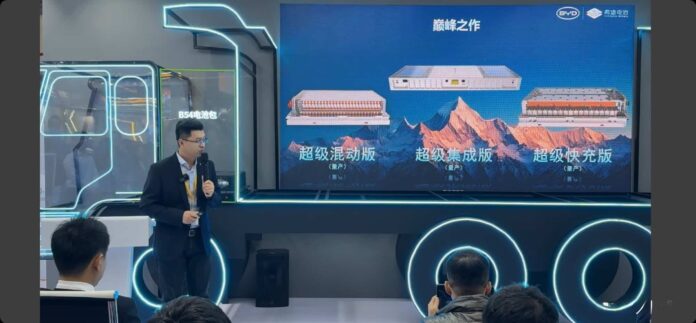Last week’s story about BYD’s construction machinery battery caused some confusion over what exactly the new battery promised. The launch on November 26 has cleared up at least some of these mysteries, and we now know that the battery announcement is actually three different models of batteries namely: super hybrid, super fast charging, and super integration. The batteries are being jointly released by BYD and XCMG, China’s largest construction machinery producer.
Parameters for the super hybrid battery are a 4C charging rate, 120wh/kg density, single pack power of 17.3 kWh, and a 20-80% SoC in 10 minutes.

For the super-fast charging battery it has a charge and discharge current of 400A. Its energy density is 160 Wh/lg, and a single pack is 37.7 kWh. The highest voltage is 1500 V, and the battery pack has a life cycle of 7000 charges. Despite being called super-fast charging, the global 2C charging rate is far from super-fast charging. However, according to BYD, a 10-minute charge can provide 1.5 hours of use.

With the super integration battery, it also has 400A charge and discharge current. the energy volume density is 320 Wh/l, while the single pack is 97.7 kWh. It’s claimed to be the first mass-produced CTB construction machinery battery. One important consideration for construction machinery and commercial vehicles is vibration. The super integration battery can withstand 6 times the vibration intensity of the old national standard.

All three battery types can operate at temperatures between -40 and 65°C and at altitudes up to 5,500 meters.
Currently, only around 3% of construction machinery is electrified. With the emission pollution of a diesel-engined construction machine equivalent to around 200 cars, electrification of construction machinery can have a big impact on emissions.
The batteries are ready for release now and should start being used by construction machinery soon, mass production has already begun.
It should be noted that all three battery models are variants of BYD’s blade battery, which is a lithium iron phosphate battery.
Editor’s note:
The battery capacities seem very low for construction machinery usage and are more in line with the pack sizes you would expect for cars. Presumably, this means that construction machinery will be fitted with multiple packs.
Source: BYD


